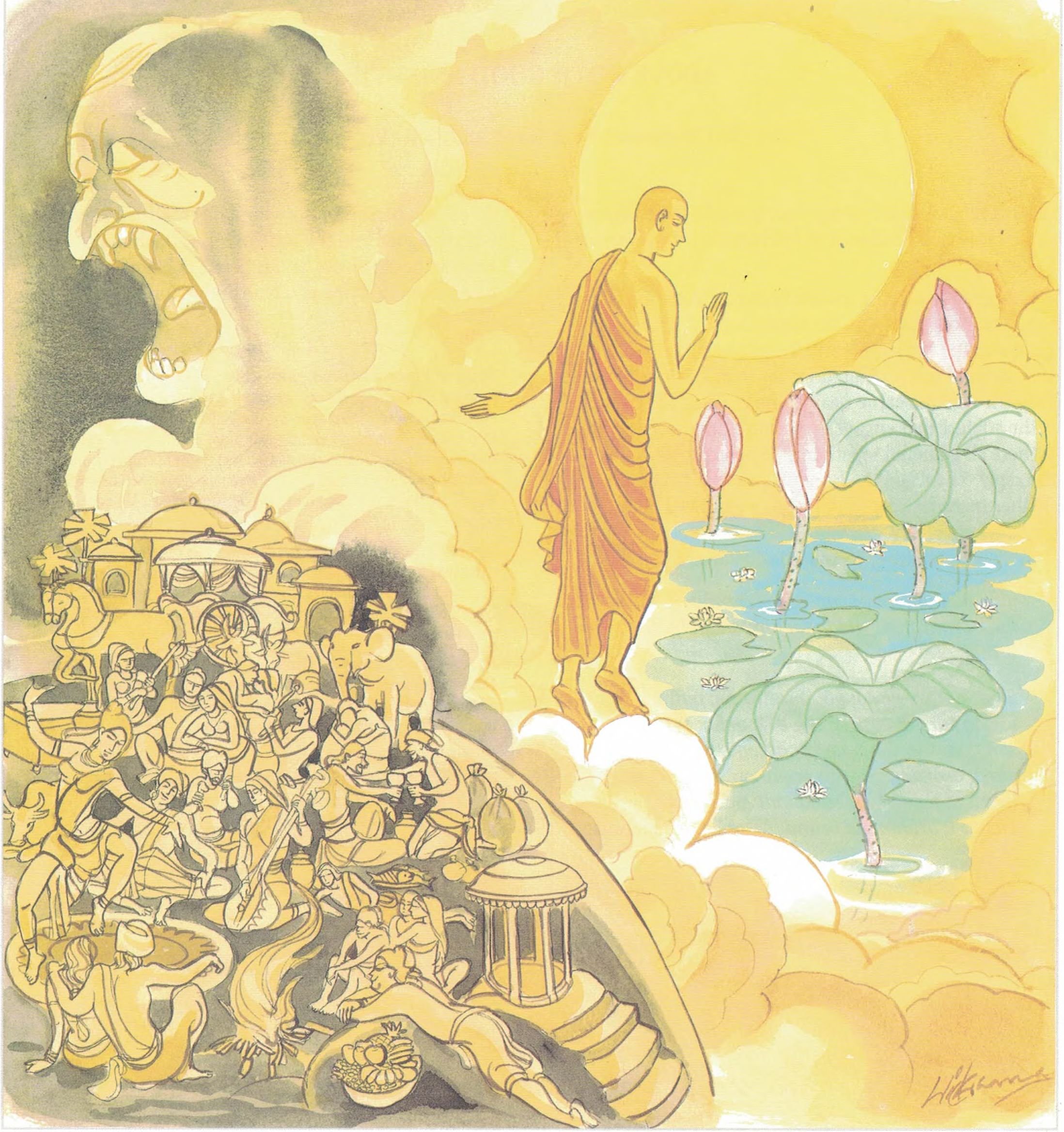Dhammapada (Illustrated)
by Ven. Weagoda Sarada Maha Thero | 1993 | 341,201 words | ISBN-10: 9810049382 | ISBN-13: 9789810049386
This page describes The story of Venerable Moonlight which is verse 413 of the English translation of the Dhammapada which forms a part of the Sutta Pitaka of the Buddhist canon of literature. Presenting the fundamental basics of the Buddhist way of life, the Dhammapada is a collection of 423 stanzas. This verse 413 is part of the Brāhmaṇa Vagga (The Brāhmaṇa) and the moral of the story is “Like the moon without spots, tranquil and clear. His delight in life ended, a brahmin true”.
Verse 413 - The story of Venerable Moonlight
Pali text, illustration and English translation of Dhammapada verse 413:
candaṃ'va vimalaṃ suddhaṃ vippasannaṃ anāvilaṃ |
nandībhavaparikkhīṇaṃ tamahaṃ brūmi brāhmaṇaṃ || 413 ||
413. Who, like the moon, unblemished, pure, is clear and limpid, and in whom delight in being is consumed, that one I call a Brahmin True.
 Like the moon without spots, tranquil and clear. His delight in life ended, a brahmin true. |
The story of Venerable Moonlight
This verse was spoken by the Buddha in reference to Venerable Chandābha. A son was born in the household of a wealthy householder in Rājagaha.
From the circle of his navel proceeded forth a light like that of the moon’s disk, and therefore they gave him the name Moonlight, Candābha.
The brāhmans thought to themselves, “If we take him with us, we can make the whole world our prey.” Accordingly they seated him in a carriage and took him about with them. And to everyone they met they said, “Whosoever shall stroke the body of this Brāhman with his hand, such-and-such power and glory shall he receive.” People would give a hundred pieces of money, or a thousand pieces of money, and thus receive the privilege of stroking the body of the Brāhman with their hand. Travelling thus from place to place, they finally came to Sāvatthi and took lodgings between the city and the monastery.
Now at Sāvatthi five billion of noble disciples gave alms before breakfast; and after breakfast, bearing in their hands perfumes, garlands, garments, and medicaments, went to hear the Dhamma. When the Brāhmans saw them, they asked them, “Where are you going?” “To the Buddha to hear the Dhamma.” “Come! What will you gain by going there? There is no supernatural power like the supernatural power possessed by our Brāhman Moonlight: they that but stroke his body, receive such and such power and glory; come have a look at him.” “What does the supernatural power of your Brāhman amount to? It is our Teacher alone who possesses great supernatural power.” And straightaway they fell to arguing, but each of the two parties was unsuccessful in its efforts to convince the other. Finally, the Brāhmans said, “Let us go to the monastery and find out whether it is our Moonlight or your Teacher that possesses the greater supernatural power.” And taking him with them, they set out for the monastery.
The Buddha, even as Moonlight approached Him, caused the special radiance to disappear. The result was that when Moonlight stood in the presence of the Buddha, he resembled nothing so much as a crow in a basket of charcoal. The brāhmans took him to one side, and immediately the brightness reappeared, bright as ever. Again they brought him into the presence of the Buddha, and straightaway the brightness disappeared, just as it had the first time. When Moonlight went for the third time into the presence of the Buddha and observed that the brightness disappeared, he thought to himself, “Without a doubt this man knows a charm by which he can make this brightness disappear.” So he asked the Buddha, “Is it not a fact that you know a charm by which you can make this brightness of mine disappear?” “Yes, I know such a charm.” ‘Well then, impart it to me.” “It cannot be imparted to one who has not retired from the world.”
Thereupon Moonlight said to his fellow brāhmans, “As soon as I learn this charm, I shall be the foremost man in all the Land of the Rose-apple. You remain right here and I will retire from the world and in but a few days learn this charm.” So he asked the Buddha to admit him to the Sangha, retired from the world, and subsequently was admitted to full membership in the Sangha. The Buddha taught him a formula of meditation which consists of the thirty-two constituent parts of the body. “What is this?” asked Candābha. “This is something which you must repeat as a preliminary to acquiring this charm,” replied the Buddha.
From time to time the brāhmans came to him and asked, “Have you learned the charm yet?” “Not yet, but I am learning it.” In but a few days he attained arahatship. When the brāhmans came and asked him again, he made answer, “Depart ye! Now have I reached the state of one who will never return.” The monks reported the matter to the Buddha, saying, “Venerable, this brāhman says what is not true, utters falsehood.” Said the Buddha, “Monks, worldly joy has been extinguished for my son; he speaks the truth.”
Explanatory Translation (Verse 413)
candaṃ iva vimalaṃ suddhaṃ vippasannaṃ anāvilaṃ
nandībhavaparikkhīnaṃ tam ahaṃ brāhmaṇaṃ brūmi
candaṃ iva: like the moon; vimalaṃ [vimala]: free of blemishes; suddhaṃ [suddha]: pure; vippassannaṃ [vippassanna]: exceptionally tranquil; anāvilaṃ [anāvila]: unagitated; nandībhavaparikkhīnaṃ [nandībhavaparikkhīna]: who has given up the craving that takes delight in the cycle of existence; taṃ: him; ahaṃ: I; brāhmaṇaṃ brūmi: describe as the brāhmaṇa
He is like moon at the full–spotless and free of blemishes. He is pure, calm, severe and exceptionally tranquil. He is unagitated. He has got rid of the craving that takes delight in the cycle of existence. That person I declare a true brāhmaṇa.
